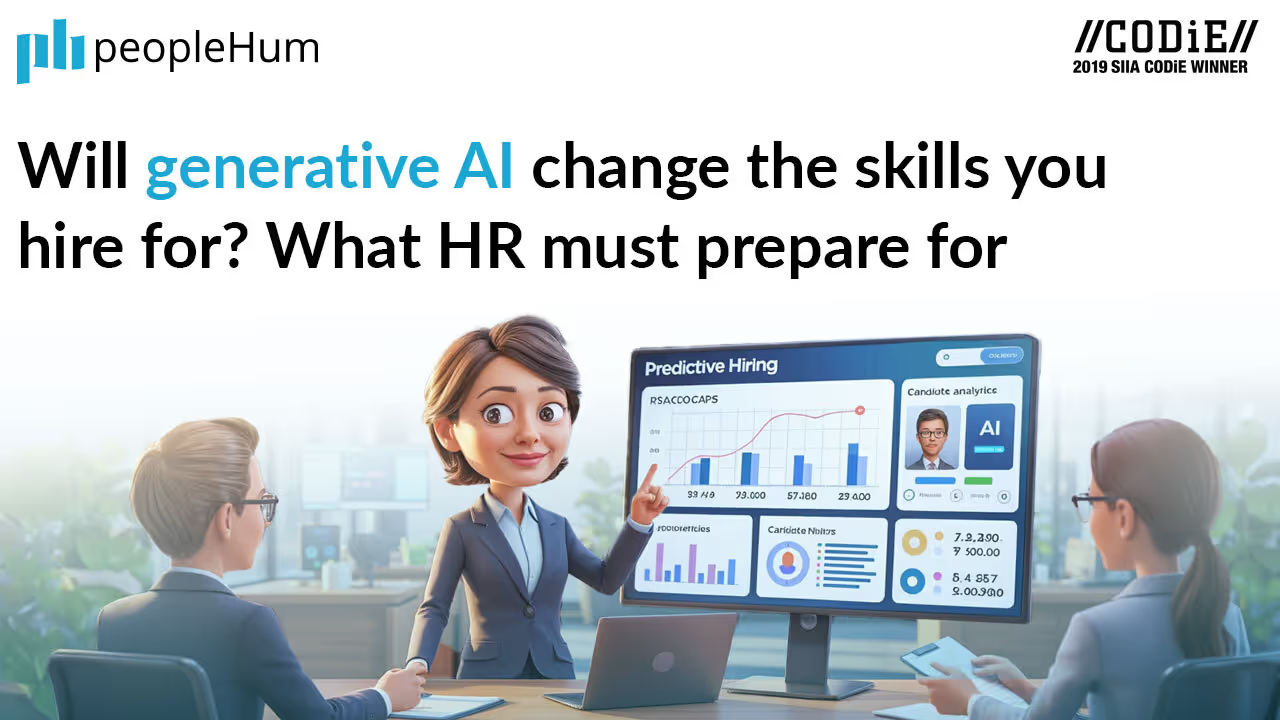Will generative AI change the skills you need to hire for?
Generative AI is a tool that creates text, images, code, ideas mimicking human output. It never sleeps, does not drink coffee, and churns out content faster than you can imagine. It’s here to embrace humans and not replace it. When we ask, “Will generative AI change the skills you hire for?”, we are asking- how does this tech reshape the way work gets done, and what does that mean for the people you bring on board? HR isn’t just hiring for today’s tasks anymore, it’s hiring for a world where AI handles the grunt work, and humans shine in ways machines can’t. This means rethinking job roles, skillsets, and even how you measure potential.
How generative AI shifts the talent landscape
Generative AI is fundamentally shifting the talent landscape by changing the nature of roles across the organization. For HR, this is a call to action to redefine what "qualified" means and to build a workforce that is future-proof.
- Roles AI can dominate: These are jobs focused on routine creation or processing of information. For example, a designer who only executes tasks in a specific tool is now competing with AI that can churn out complex visuals in seconds.
- Roles where humans Reign: These are the jobs that require uniquely human skills like judgment, strategic thinking, adaptation, and innovation.
- Look for adaptability: The new "qualified" employee is one who can adapt, innovate, and work alongside AI. For instance, you need designers who can guide AI tools to achieve creative outcomes, not just push pixels.
Skills that survive the AI wave
The rise of AI necessitates a shift in focus for hiring, as certain human skills remain irreplaceable by technology. HR departments must prioritize competencies that leverage human nuance, such as emotional intelligence, critical thinking, and creativity, which are the 'AI-proof' superpowers for a future-proof workforce.
Key skills that are essential and survive the AI wave:
- Emotional intelligence (EQ) and soft skills: AI has significant blind spots in human emotion and interpersonal dynamics. Skills like communication, empathy, and collaboration are AI-proof must-haves. These are crucial for handling the messy, nuanced work that ensures an organization functions smoothly, especially as machines take over repetitive tasks.
- Critical thinking and intuitive problem-solving: While AI excels at crunching data, it cannot replicate the human capacity for critical thinking or thinking outside the box. Problem-solving that demands intuition or a foundation in ethical judgment remains firmly in human territory.
- Creativity: This is highlighted as a core human superpower that AI cannot fake. Creativity involves generating truly novel ideas and conceptual frameworks, going beyond pattern-matching or rearranging existing data, which is a fundamental limitation for current AI models.
- Leadership and conflict navigation: Effective leadership involves competencies AI cannot substitute. A manager who can rally a team, navigate conflict, or make tough calls under pressure is extremely valuable. While AI can suggest strategies, it is incapable of feeling the pulse of a team or making the necessary gut calls when data is insufficient or runs dry.
New skills HR must hunt for
The following are the new skills HR must actively seek out as AI takes over predictable tasks:
- AI literacy: This does not require coding expertise, but people must know how to use generative AI tools effectively. This involves being able to prompt a model to write decent ad copy (for marketers) or understanding how AI can streamline their workflow (for data analysts).
- Data interpretation: While AI generates insights, candidates must be able to make sense of them. HR should prioritize individuals who can translate AI’s output into actionable strategies, acting as a 'translator' for the machine's fluent language.
- Creativity with a tech twist: AI generates ideas, but humans are needed to refine them, add context, or spot flaws. This skill is demonstrated by a designer who can tweak AI-generated mockups or a writer who can polish AI-drafted content, essentially seeing AI as a partner.
Upskilling: HR’s new battleground
Hiring new talent is only half the equation. What about your current team? If you think you can just swap out “old” employees for AI-savvy ones, you’re dreaming. Try explaining that to your CEO when turnover costs skyrocket. Instead, HR needs to lead the charge on upskilling.
- Necessity of upskilling: Trying to simply replace current employees with AI-savvy new hires is unrealistic and would cause turnover costs to skyrocket. HR must instead lead the charge on upskilling the existing team.
- Creating a safe environment for experimentation: HR needs to create spaces where teams can experiment with AI without the fear of breaking anything.
- The goal: The objective is not to turn every employee into a tech genius, but to make them comfortable collaborating with AI in their daily work.
- Building loyalty and retention: Upskilling builds employee loyalty, as employees who feel supported in learning new skills tend to stay. Conversely, those who feel left behind will look for other opportunities.
Upskilling also builds loyalty. Employees who feel supported in learning new skills stick around. Those who feel left behind? They’re already polishing their LinkedIn profiles. HR’s job is to make sure your workforce sees AI as a tool to make their jobs better, not a threat to their paychecks.
The AI-Human collaboration mindset
Recruitment and interviewing for mindset
- Prioritise candidates with a "Humans plus AI" mindset: HR needs to hire people who view the future as one of collaboration, seeking out candidates who are naturally curious and ask, "How can I use AI to do my job better?" rather than those who resist change.
- Integrate experiential questions into interviews: Introduce specific interview questions, such as, "Have you ever used an AI tool to solve a problem? Tell me about it," as the candidate's detailed answer is a more reliable indicator of their adaptability and willingness to see AI as a supportive teammate than standard resume bullet points.
- Champion a safe culture for AI experimentation: HR is responsible for fostering a work environment where the use of new AI tools is celebrated and encouraged, ensuring the team is not afraid to try them out for fear of "messing up," which is critical for remaining competitive and building the necessary adaptive skills.
The HR Toolbox: Tools and strategies for the AI era
The transition to an AI-driven future requires a strategic approach from HR leaders. The goal is not just to react to the AI wave but to build a future-ready team that can thrive alongside it.
1. Recruitment and talent acquisition
Leverage AI for initial screening, but final decisions remain human: Implement AI-powered recruitment platforms to efficiently screen resumes, quickly narrowing down the candidate pool by spotting patterns and qualifications you might otherwise miss, but ensure human intuition and judgment are prioritized for the final hiring calls.
2. Learning and development (L&D)
Establish AI-focused learning ecosystems: Invest in robust Learning Management Systems (LMS) that provide accessible, dedicated courses on AI literacy found on platforms like Coursera or LinkedIn Learning, and pair this external content with valuable in-house sessions where employees can share practical applications of AI in their specific day-to-day work.
3. HR leadership and strategy
Mandate personal AI fluency for HR leaders: HR leaders must actively educate themselves on current AI technologies, including playing and experimenting with generative AI tools, because a lack of firsthand understanding will prevent them from effectively strategizing, leading the charge, and preparing the entire team for the inevitable changes ahead.
Wrapping it up
This blog is built for HR leaders staring down the barrel of an AI-driven future. Generative AI is here, and it's changing what you need from your people. The skills you hired for yesterday won't cut it tomorrow. Start rethinking your approach now, or you'll be playing catch-up while your competitors build teams that thrive.



































.png)

%20(1).avif)












